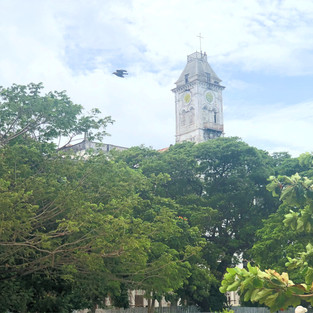Island of Stone and Spice
- Kevin Mohr
- Jul 3, 2020
- 5 min read
Updated: Aug 8, 2020
January 15th: Zanzibar

We delve into the hypnotic warren of narrow streets that is Stone Town, winding our way along cobblestone passages scarcely six feet wide in places. The walls rise above us to create shade and passageways for the breeze that scurls against the plastered and whitewashed walls of stone and mortar. Some buildings are blazing white while others are dark with mildew growing in leprous patches on the walls in the humidity. Some are pitted, as if with a pox, the mortar crumbling, fine grains sliding down the dirty wall, revealing beneath an aggregate of sand and pebbles like the soft stone of an ancient riverbank.
Saif, our guide, leads the way. "This place, Zanzibar, this is spice island, this is the land of stone and spice," he says. He speaks with long lazy vowels and never stops, with no need for periods or pauses for thought. Names and dates rattle off his teeth like falling pebbles. “Jambo, Jambo,” he says to the locals and they nod and smile and respond. Jambo. Acuna matata. Salaam.
He speaks of slaves and spies and pirates and rebellion. In the north there are slave caves where slavery was kept alive, chained underground for nearly a decade after it was outlawed in 1873. He knows the politics of his country now and back three hundred years and the influence of Iran and the British who built the mosques and the colonial ramparts and walls that surround us. “That is why,” he says like a mantra. “That is why.” That is why the people are angry or why the country should be independent and why there is so much corruption. His eyes glint with seditious light. That is why, he says while his fingers slowly wave like stretched sinew before him, gesturing like a conductor as he narrates the dates of wars and weaves their stories. The forty-five minutes war was the shortest of all time and British ships crushed the Arabs in 1896 and took the island and the spice and made their homes and churches here in the most exotic reaches of their empire - until they ceded Zanzibar independence in 1963. Revolution followed, bringing with it the spectre of communism, and eventually the merger with Tanganyika, to form the new country of Tanzania. The revolution was fifty-six years ago, in January of 1964. Now, banners and garlands hang from the buildings, commemorating it. That is why.
The white faces of tourists bob amongst the locals but they are swallowed amidst the crush of people and mopeds streaming through the congested arteries of Stone Town. Black faces, white hijabs, and glittering headscarfs stream by while others languish on the stone stoops that run along the base of the buildings beneath electrical wires strung between the walls and balconies. Some wires hang loose, dangling low in the streets like severed tendons. They stretch helter-skelter as if giant drunken spiders infest this place and have woven their nests above this hive of people, above the shops of spices, coffee and artwork. Wooden masks hang on walls along with paintings of people on bright backgrounds, stylized, all thin black limbs and attenuated black arachnid lines reflecting the nest of wires above.

“These doors, see, they are teak. Very old, Islamic doors carved by hand with stories here carved along top, see, and down side carved also with compass roses for sailors that came to this island - that is why - and the iron spikes for the elephants that pushed walls up in days of ancient Islam, but here, see, they replace wood at bottom because the termites eat it. It rots as well, see, this is new, that is why.”
There is a whole street of men winding new copper wire into the guts of antiquated generators and machines arcane, busted and atavistic. They spill out of a door. Junk and metal in a broken cascade upon the ground where the men work.
We emerge from the narrow streets into the market, Saif still talking. He doesn’t sweat in this primeval heat. He just walks and talks, his eyes dark and his skin dry beneath the tight curls of his patchy beard as his fingers ripple and beckon. Onward. Into the maelstrom of the marketplace. There are more spices here than there are names for them. From the spice stalls we enter the covered stench of the fish market where octopus and prawns and tuna lie unrefrigerated on stone. Squid pulled from the deep crawling with flies. Next to the fish market, meat hangs on hooks, butchered raggedly, an abattoir where people poke and pull at the drooping flesh or inspect the bits of it upon the counters, picking the choicest pieces.
(Photo Credits: Mick Sheehy)
Beyond the market we eventually reach the port and the long esplanade that stretches like a Spanish malecon past a vast courtyard of palms and grass and a rotting clocktower, it’s blind eye gazing out past the boats that bob in the harbour, at anchor in the breeze.
It seems to always be windy here and wooden dhows go scudding by, boats centuries old, running ahead of the wind, each with their single sail an exaggerated crescent stretched taut on its arching boom that rears up and back at a vicious angle to the top of the wooden mast like a talon, the heavy canvas cutting the wind like a scythe. They share the water with a high-speed catamaran ferry and freighters. Old converges with the new just as cultures have converged and clashed here for centuries, Christian churches taking root next to mosques and Hindu shrines.
Past the courtyard, a castle. Its walls are weary, streaked with black and crawling with green as it is taken back into the ground, it’s ramparts like broken teeth.

Later, on my balcony, I write in the shade and the breeze off the water. The whitewashed facades of the colonial buildings line the beach, demarcating the perimeter between past and present. On one side of this boundary are hundreds of years of history. On the other, on the sand and in the water, the locals have come out of their shady sanctuaries beneath palms and verandas and shanty shacks. The sun is low and swollen in its languid decline and the warm water is full of black bodies and laughter. The surf is falling on the sand. The laughter and singing and splashing, these things exist right now. Kids running in the sand playing soccer - this is happening now. All suspended in the breeze that comes off the water and rises to my balcony carrying scents of the distant places from which it comes, past scents from places unseen. Like the light from stars.

Where did this wind begin? Only days ago I was flying up and down the ancient course of the Rift Valley in Kenya, the cradle of humanity where some of the oldest hominid fossils in the world have been found. There, the bones of human evolution have been eroded from cliff faces, resurrected after millions of years in the ground. Bleached and cracked and brittle they are exposed to the same sun beneath which they died, their last breath perhaps still carried by the same breeze that blows now across this torpid beach to meander through the palms and vaulted halls and arches of this old stone hotel.
In the morning it will be quiet once again. It will be still, but for the flick and snap of a rag as a man polishes the old mahogany posts and balusters by hand, bringing them to the same lustrous shine and colour of his skin.





























Comments